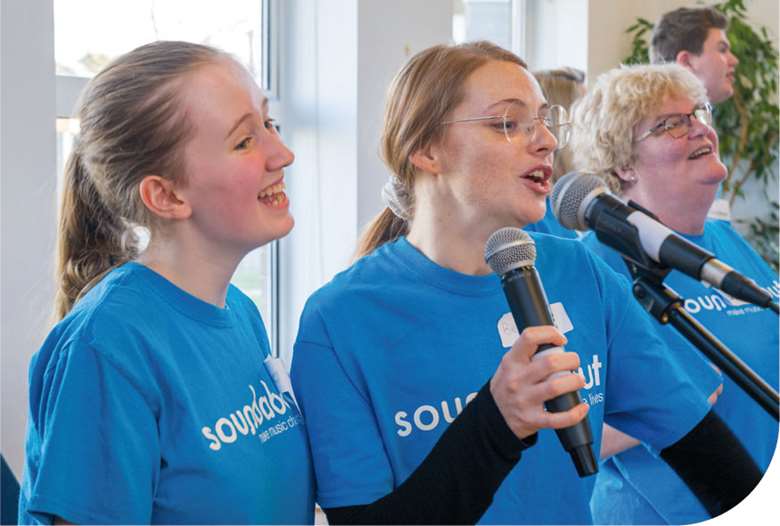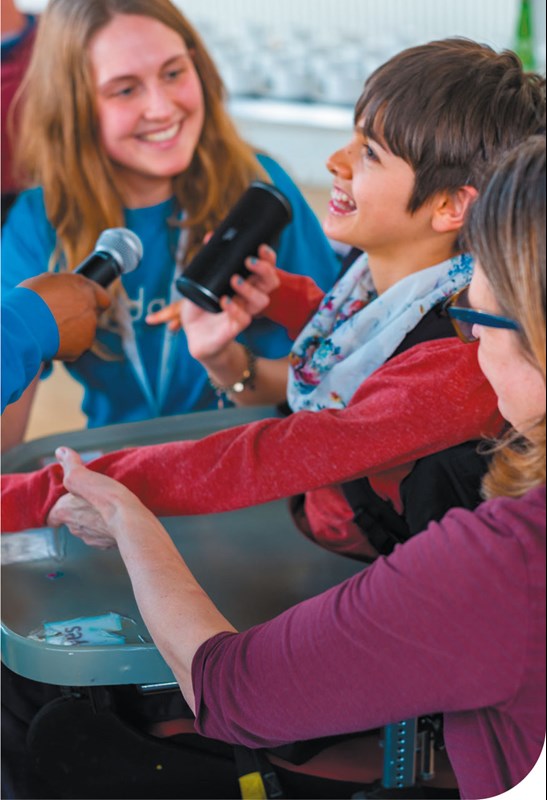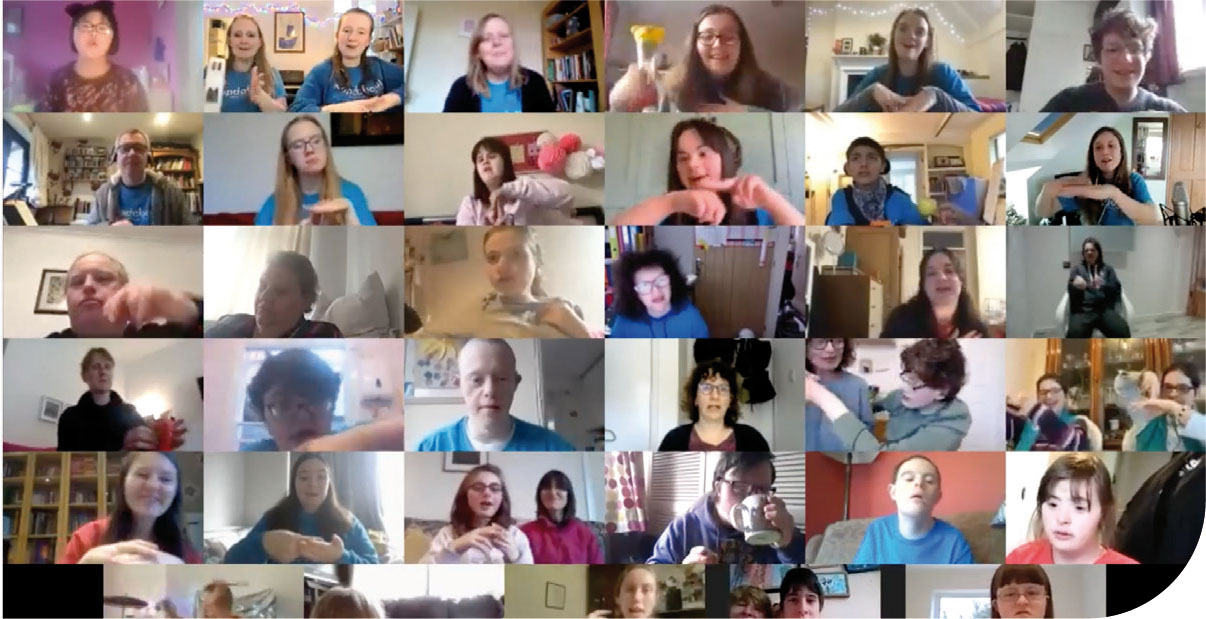Tools to be heard: Soundabout Inclusive Choirs
Clarissa Payne
Tuesday, June 1, 2021
Soundabout's first inclusive choir was only formed a few years ago, but has already blossomed into 12 choirs giving a voice to young people and adults with severe and profound learning disabilities. Clarissa Payne speaks to CEO Clare Cook to find out what a truly accessible musical community looks like

All images: Rob Farrands
'The heart of our approach is that the voice is the sound associated with the person.’ Soundabout CEO Clare Cook is giving me the lowdown about the longstanding musical inclusion charity's move into inclusive choirs. The first choir, for people of all ages who have learning disabilities, was established in Oxford in 2019. ‘The choir members range from, for example, someone with profound multiple learning disabilities who needs two carers and is non-verbal and not mobile – but able to communicate through music – to a Grade 8 music student,’ Cook explains.
Soundabout's approach to ‘the voice’ is what makes this work – sounds made with assistive technology or using the body are welcomed as an extension of the voice. ‘Quite a few of the choir members will use some kind of technology,’ says Cook. ‘They might use an Eye Gaze, they might use a Clarion, they might use an iPad with something like ThumbJam which uses the pentatonic scale, and through various methods of touch make their contribution. They might be body percussionists.’ The varied voices and sounds of the choir members are joined by instrumentalists providing a fluid accompaniment.
 Creating space
Creating space
I ask Cook to describe a typical choir session. ‘We always start with the “Hello” song, making sure that everyone who wants to can have their moment, their voice. There's no rush, we make sure that people have time to process – it might take quite a long time.’ She goes onto explain how the choir leaders work in a group with people of such wide-ranging abilities and needs. ‘Pace is the key thing. We take people as they come and start at the level of the least able in the room. That is quite an important learning thing for everyone else; to have patience, to take your turn. It's part of those wider skills that you develop in a choir.’
After the grounding start to the session, the singers move on to repertoire – the most popular currently being a gospel medley and the Abba songs from Mamma Mia! ‘We work through two or three songs and break them down into very simple elements – we might have a harmony part or a rhythmic part. We might take a soundscape approach. Often there's a call and response element, so the room would be split in two.’
Leaders are alert to the group versus individual dynamics that exist in all groups of singers and instrumentalists. ‘There are always moments for soloists and leadership within the songs. If someone knew a song really well, they could demonstrate it at the front of the group. To begin with, no one wanted to and everyone was a little bit shy, but that confidence has really built. We always have a solo performance slot where someone might have prepared something and could share what they wanted to share. It could be a sound, it could be a song, it could be a poem, it could be a piece of news.’ Choir sessions always come full circle and end with the ‘Goodbye’ song, with the focus and pace again shaped by the choir members.
Preserving community
As the first reports started to come from China about an alarming new virus last year, the Oxford-based choir was preparing for a performance with the King's Singers. ‘We're very aspirational,’ Cook says. ‘We want to perform, release songs and really aim high.’
Those plans, like millions of others, were abruptly put on hold, and Cook and the Soundabout team had to think fast about what to do. ‘When lockdown hit there were as many as 70 people coming to a choir session,’ she tells me. ‘The choir had already come to play such an important part in people's lives. The friendships, the confidence – the growth of confidence of the members was extraordinary. Obviously, everyone was very, very thrown. We decided that we'd just get the choir online and go from there – we'd tell everyone to come onto Zoom and we'd just do our best and work it out as we went along.’
The choir isn't just about singing together; Soundabout's mission is to create ‘musical communities without barriers’, and Cook's immediate fear was for the community element. ‘The sessions were 90 minutes long, and half an hour of that was having teas and coffees – chatting and having that community. It's so important,’ she explains.
‘Some of the parents of the members who are more profoundly disabled would explain that in no other context do they have friends, do they have people who think “Oh where's so-and-so?” That friendship building element is so important – in their own age groups but also with people from different age groups. Social skills and social benefits are as important if not more important than the musical benefits.’
As it turned out, moving online presented as many opportunities as it did challenges. Soundabout went into lockdown with one choir. As of March 2021, after featuring on BBC News at the height of lockdown in May 2020, they have 12. ‘Fergal Keane covered what we do – it was the most beautiful piece. As a result of that, the message really got out about what we were doing. For a lot of our families, we've started to come to them in a way that we never even really considered possible before,’ Cook said.
Best of both
Considerations around access are of course nothing new for Soundabout. ‘The whole purpose of the inclusive choir was to build a community around people with profound learning disabilities, with their access at the heart of the way the choirs work, and then build out from there,’ says Cook.
Access is never one-size-fits-all; for some choir members, the move to online and singing to a screen threw up a new barrier. For others, it was a game-changer. ‘There are quite a few people who are members of the choir who've never been able to be before because of all the considerations around personal care and transport.’ Zoom sessions, while lacking the freer social aspect of being together in a hall, offer the chance to focus on detail and really make sure everyone is being heard.

Soundabout on Zoom
‘I call it the beauty of the mute button,’ Cook says. ‘In-person choir sessions would be a bit more of a melee, but on Zoom we're able to see what's going on and hear the contribution people are making, and everyone appreciates it. That's a very, very empowering thing.’
Is Cook planning to keep some of Soundabout's work online once the pandemic is over? ‘Definitely. In fact, we've just done a survey of our choir members to find out what people want. We offered the options of face-to-face only, online only, or a mixture, and 80 per cent went for a hybrid approach. For us that works really well because we really are covering both options. Where digital is a barrier for some people, making sure there's a face-to-face element to the work will be really important when it's safe to do so.’
Finally, I ask Cook about the current state of inclusive music and her hopes for the future. ‘As well as the choirs, we set up all sorts of other provision – home school club, after school club – a whole weekly schedule of online sessions that families who have obviously been hugely affected by the lockdown are able to access when their children can't go to school.’
Soundabout has just secured funding for a family support post to continue this work. ‘Musical inclusion is more than sitting here and saying “anyone can come”. It's proactively making sure that anyone really can come and that's actually a much bigger and more complicated thing. It's all of our responsibility to make sure that the barriers are removed from participation for someone with a disability. It's so exhausting for someone with a disability, or their family, to have to think through and be hit with accessibility issues constantly. That's our job.’
As we start to slowly come out of lockdown, Soundabout is working on partnerships with Music Education Hubs around the country and considering when and how performances can re-start. Cook comes back to Soundabout's central principle: ‘From a musical perspective, it's making sure we have the tools to ensure that someone can be heard. Physical tools, instruments – but also the tools in ourselves to know how to listen.’

